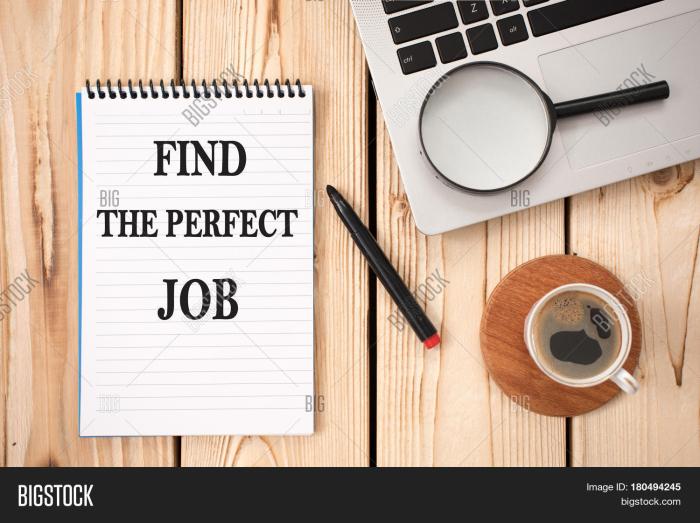Embark on a journey to discover the ideal job within a mere three months with How to Find the Perfect Job in 3 Months. This guide promises to unveil the secrets to securing your dream job with precision and efficiency.
Learn the art of navigating career paths, crafting impeccable resumes, acing interviews, and more in this detailed exploration.
Researching Potential Careers

Researching potential careers is a crucial step in finding the perfect job. By exploring various industries and job roles, you can gain valuable insights into different opportunities available to you. This research allows you to identify the skills and qualifications required for each career path, helping you make informed decisions about your future.
Identifying Transferable Skills
When researching potential careers, pay attention to the transferable skills that you possess. These are skills that can be applied across different job roles and industries, making you a versatile and valuable candidate. To identify your transferable skills, reflect on your past experiences, both in and out of the workplace. Look for common themes and skills that can be adapted to different career paths.
- Communication skills: Whether it’s written or verbal communication, strong communication skills are essential in any job role.
- Problem-solving abilities: Employers value individuals who can think critically and find innovative solutions to challenges.
- Leadership skills: Even if you’re not in a management position, demonstrating leadership qualities can set you apart from other candidates.
- Adaptability: In today’s fast-paced work environment, being adaptable and open to change is a valuable skill to have.
Networking with Professionals
Networking with professionals in your desired field can open doors to new opportunities and valuable insights. Attend industry events, join professional organizations, and connect with professionals on platforms like LinkedIn. Building a strong network can help you learn more about different career paths, gain mentorship from experienced professionals, and even uncover hidden job opportunities.
- Attend industry conferences and seminars to meet professionals in your desired field.
- Join online communities and forums related to your industry to connect with like-minded individuals.
- Set up informational interviews with professionals to learn more about their career paths and gain valuable advice.
Crafting a Standout Resume and Cover Letter

Creating a compelling resume and cover letter is crucial when applying for a job. These documents serve as your first impression to potential employers, so it’s essential to make them stand out from the competition.
Key Elements of an Impressive Resume and Cover Letter
- Clear and concise formatting: Use a clean layout with consistent formatting to make your resume easy to read.
- Relevant information: Tailor your resume to highlight skills and experiences that are directly related to the job you’re applying for.
- Quantifiable achievements: Include specific accomplishments and results to demonstrate your impact in previous roles.
- Customization: Customize your cover letter for each application, addressing the company’s needs and explaining how you can contribute.
- Professional tone: Maintain a professional tone throughout your resume and cover letter, showcasing your communication skills.
Strategies for Tailoring Documents to Specific Job Descriptions
- Review the job description carefully to understand the key requirements and responsibilities.
- Match your skills and experiences to the job requirements, emphasizing relevant qualifications.
- Incorporate s from the job posting to ensure your resume gets noticed by applicant tracking systems.
- Highlight achievements and experiences that align with the company’s values and goals.
- Show enthusiasm for the position and company in your cover letter, demonstrating your genuine interest.
Common Resume Mistakes to Avoid
- Spelling and grammar errors: Proofread your resume and cover letter carefully to avoid mistakes.
- Using a generic template: Customize your documents to showcase your unique qualifications and experiences.
- Exaggerating or lying: Be honest about your skills and experiences to avoid potential issues during the hiring process.
- Being too vague: Provide specific examples and details to support your claims and demonstrate your capabilities.
- Neglecting to follow application instructions: Ensure you submit all required documents and information as requested by the employer.
Nailing the Job Interview

Successfully navigating a job interview can be the key to landing your dream job. Here are some tips to help you prepare and ace different types of job interviews.
Preparing for Different Types of Job Interviews
Job interviews come in various formats, such as behavioral, case study, and group interviews. Here’s how to prepare for each:
- Behavioral Interviews: Be ready to share specific examples from your past experiences that demonstrate your skills and abilities.
- Case Study Interviews: Practice solving case studies in your field to showcase your problem-solving skills and analytical thinking.
- Group Interviews: Show your teamwork and leadership skills by actively participating in group activities and discussions.
Researching the Company and Practicing Common Interview Questions
Before your interview, research the company thoroughly to understand its values, goals, and culture. Also, practice common interview questions like:
“Tell me about yourself,” “What are your strengths and weaknesses,” and “Why do you want to work here?”
Effectively Communicating Skills and Experiences
During the interview, effectively communicate your skills and experiences by:
- Using specific examples to illustrate your accomplishments and capabilities.
- Highlighting how your skills align with the job requirements and the company’s needs.
- Demonstrating your enthusiasm and passion for the role and the organization.
End of Discussion

In conclusion, How to Find the Perfect Job in 3 Months encapsulates the essence of successful job hunting in a concise and actionable manner. Armed with this knowledge, you are well-equipped to embark on your job search journey with confidence and determination.